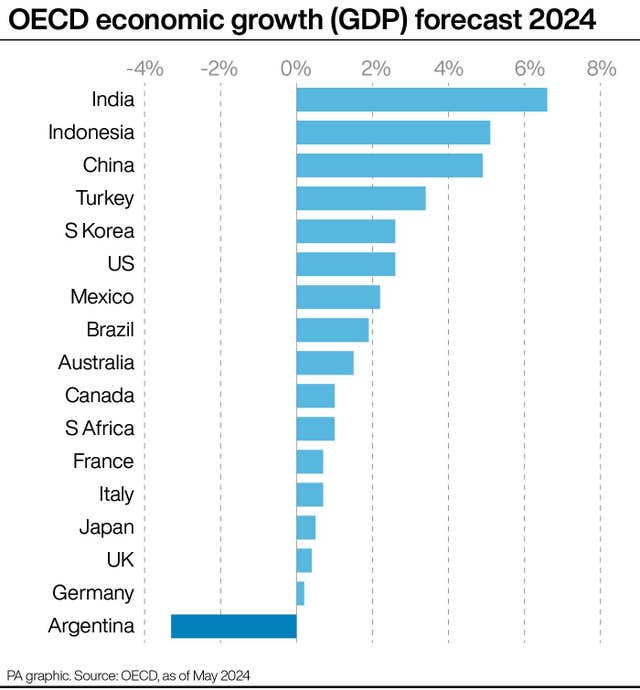The UK economy is set for “sluggish” growth over the next two years and is likely to miss previous forecasts, according to economists.
The Organisation for Economic Co-operation and Development (OECD) has downgraded its UK growth projections for 2024 and 2025, indicating it will witness the weakest growth across the G7 group of major economies next year.
The organisation said in its latest economic outlook report that there are “some signs that the global outlook has started to brighten” amid easing inflation.
Global gross domestic product (GDP) is expected to grow by 3.1% this year, unchanged from 2023.
However, the UK’s economy is expected to grow at a much slower rate after interest rate rises in order to bring down inflation.
The economic organisation said “GDP growth is projected to remain sluggish” in the face of a “waning drag from past monetary tightening”.
The economy grew by 0.1% last year and is expected to see growth improve to 0.4% this year, the OECD said.
However, it represents a downgrade to forecasts after previously predicting 0.7% growth for 2024.
It also means it is on track to record the second weakest growth across the G7, with only Germany – which has a growth forecast of 0.2% – due to see a smaller increase.
On Thursday, the new report also said the economy is on track to grow by around 1% next year. This is slower than projected for Germany and the other G7 nations – Canada, France, Italy, Japan and the US.

The OECD said higher wages will help consumer spending over the next two years but could contribute to inflationary pressure as the Bank of England continues with efforts to get Consumer Price Index (CPI) inflation down to its 2% target rate.
“Stronger real wage growth will support a modest pick-up in private consumption,” the report said.
“Headline inflation is expected to continue moderating towards target as energy and food prices have eased substantially, but persistent services price pressures will keep core inflation elevated at 3.3% in 2024 and 2.5% in 2025.”
It also predicts the Bank of England’s Monetary Policy Committee (MPC) will start cutting interest rates – which currently sit at a 15-year-high of 5.25% – in the third quarter of this year.
UK interest rates are on track to drop to 3.75% by the end of 2025, it said.
Meanwhile, the UK’s unemployment rate is expected to rise over the period.
The unemployment rate unexpectedly increased to 4.2% for the latest three-month period to February.
The OECD said this is due to continue increasing and reach as high as 4.7% in 2025 “as the labour market cools”.
Chancellor of the Exchequer Jeremy Hunt said: “This forecast is not particularly surprising given our priority for the last year has been to tackle inflation with higher interest rates.
“But, now we are winning that war, growth matters, which is why it is significant that last month the IMF (International Monetary Fund) predicted the UK will grow faster over the next six years than any European G7 country or Japan.
“To sustain that we need to stick to our plan – competitive taxes, a flexible labour market and far-reaching welfare reform.”
Shadow chief secretary to the Treasury Darren Jones said: “Today’s news that growth has been downgraded again reminds the British people what they already know: after 14 years of failure, the Conservatives cannot fix the economy because they are the reason it is broken.
“It’s time for change. Only Labour has a long-term plan to grow the economy and make working people better off.”
Barret Kupelian, chief economist at PwC UK, said: “The OECD’s forecasts show the UK is stuck in the ‘slow growth’ lane, when compared to other large European economies.
“This is also supported by our own in-house forecasts.
“In the short term, we expect economic activity to pick up, mainly led by private sector activity and consumer spending.
“Some of this will be helped by the Bank of England likely gradually easing its monetary policy in the second half of the year.”
